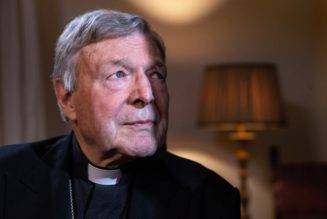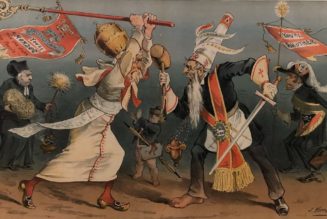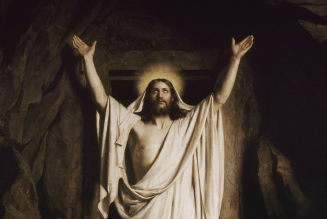Happy Friday friends,
I hope you had a blessed and solemn Epiphany, or Capitol Riot Day, whichever occasion you mark with greater religious devotion in your home.
On January 6, or the nearest Sunday, if you’re a killjoy bureaucrat who likes cutting Christmas short, we mark the magi from the East receiving a theophany, and the openness of God’s plan of salvation to all of mankind. Back in the days when people had parties, and friends, my wife and I would hold our Christmas party on the eve of Epiphany, just for the joy of stretching the season out to the final 12th night.
Well, that’s all done with now, and it’s time to get on with the year.
‘Nun’ poorer
Perhaps the crappiest present anyone got this year, came from the Indian government which revoked the Missionaries of Charity’s ability to receive foreign donations on Christmas Day.
And by the way…
You may have seen something of this story over the holidays, and wondered about the somewhat common use of the word “nuns” to describe the sisters. So, are they “nuns”? And what’s a friar, anyway? And who lives in a monastery?
Space, ethics, and Star Wars
If you have been reading The Pillar for a while now, you have probably noticed that we like space. We like space suits, spaceships, satellites, space watches — all of it.
Green’s recent book, “Space Ethics,” is an ethical toolkit for thinking about space exploration, and he and Charlie talk about what it means for humanity to get off this rock. Here’s a teaser:
“What were once ‘the Heavens’ have become ‘space.’ I think this transition is worth pondering.
One major issue is metaphysics: the study of being, purpose, and all the first principles that everything else is built upon. These issues become surprisingly important when it comes to space exploration, use, and settlement.
After all, why are we here in the universe? Does humankind have a purpose or not? If we have no purpose then we can do anything we want. But if we do have a purpose, then only those choices that lead us towards fulfilling our purpose can be called good.”
And yes, they absolutely talk about Star Wars and the ethics of blowing up the Death Star. I cannot say I agree with their conclusions, but it’s the thoughtful and intelligent treatment you know this subject needs.
Pope Francis and the dubia
Earlier this week, we reported on a newly leaked piece of evidence in the Vatican financial trial: a lengthy memo to prosecutors from the second-in-command at the Secretariat of State.
In outlining the culture of chicanery and obfuscation which he found at his department in 2018, Archbishop Edgar Peña Parra also confirmed that Pope Francis approved a controversial payment to Gianluigi Torzi, the broker at the center of the London property debacle.
Quite a few commentators have suggested that this supposed revelation (it’s actually been known for some time, and reported on) will herald the collapse of the prosecution’s case, and vindicate several former Vatican officials charged with a range of financial crimes — if the pope approved it, it must have been legal, right? Hardly.
Confident predictions of the trial’s imminent collapse should be taken with a shovel of salt. But that doesn’t mean what the pope approved and when is a moot point. Or that his silence might impact the judicial process, or even derail some of the charges. Far from it, especially considering that some of the defendants, like Cardinal Angelo Becciu, are likely to claim papal authorization for some of the crimes they are alleged to have committed.
When the trial does move into the evidentiary phase, there will be hard questions raised about, for example, Becciu’s reported claim that the pope approved the clandestine payments to his private spy, and insisted on secrecy about them within the department.
Francis is going to face the tough choice of either refuting his former chief of staff’s claims, or remaining silent.
Silence might feel like the path of least resistance, and the best way for the pope to keep the trial at arm’s length, but it could also look a lot like a papal torpedo at the judges’ chances of getting to the truth of the charges.
It is worth contrasting the extreme discomfort the financial scandal trial is causing around the Vatican with the quick and quiet extrajudicial process deployed to defrock Theodore McCarrick two years ago.
That process collected evidence in private, before unnamed judges delivered summary verdict on an unknown number of unspecified alleged offenses. While no one could claim it was transparent or confidence inspiring, it spared a lot of senior churchmen having to answer a lot of awkward questions about who knew what when, while delivering the result it was supposed to.
The current trial has, in full public view, offered the unseemly spectacle of leaks and press briefings from both sides, and painted an increasingly detailed portrait of an utterly dysfunctional curial department, shot through with personal rivalries, political intrigue and financial misconduct.
Maybe worse, from an institutionalist’s perspective, is that there’s no clear result to hope for: High level convictions would only confirm the scale of corruption, but the trial collapsing would cap off a years-long scandal with an almighty farce.
Francis may well come to regret unleashing a full public trial, one which cannot be controlled or quietly resolved when it becomes inconvenient. But the judicial genie is out of the bottle now, and there’s no obvious way of getting it back in without causing irreparable damage to his reforming agenda and legacy.
Uncomfortable though it may be, the pope may find his best option is to trust the process he set in motion, and offer to answer whatever questions the judges may have.
Think of the children
Also this week, Pope Francis made some much-reported comments on the having of children, you may have noticed.
Remarking on the demographic decline hitting many parts of the world, not least Italy, the pontiff noted the “selfishness” which leads people to choose not to have kids at all, and to fill the emotional void with pets.
“We may laugh,” the pope said, “but it’s a reality.”
It is indeed a reality. In an office building in which I used to work here in Washington, there was a woman I’d often see in the elevator. She’d bring her fully clothed dog to work in a baby stroller. It was hard not to laugh. That she worked at the American Psychological Association struck me as especially funny.

Francis’ comments, that a denial of fatherhood and motherhood “diminishes us” and our humanity seemed, to me anyway, self-evident, my own recent first-time fatherhood notwithstanding. Though, of course, his remarks were not well received everywhere — cat people are notoriously prickly, you know.
The secular commentariat has been alive with rebuttals to the pope’s charge that many forsake parenthood for “selfish” reasons. CNN, for example, lamented that Francis’ comments were “surprising coming from a progressive pontiff.”
There is a certain fashion for voluntary sterility, and a constant drumbeat of thinkpieces insisting that procreation is bad for the environment; that parenthood is, perversely, the ultimate “selfish” choice. But according to the latest polling I have seen, the pope is correct: the reason most people choose not to have children is because they simply don’t want them.
It is hardly surprising, given the last two years, which have acted as a hyper-accelerant to our burgeoning social trend towards isolation and individualism. Because of the pandemic, the concept of being “socially distant” has gone from being a term of dysfunction, to a medical necessity, to a generally accepted good in itself.
Hell, Sartre observed, is other people. Months of isolation, political toxicity, and economic insecurity have won many over to his way of thinking. Who in this world would welcome an utterly dependent, often totally demanding, new life?
But that attitude is, as the pope notes, a demographic problem, and a deep loss to our humanity.
Of course, for many people not having children is a cross, not a choice — and for whom the wider cultral rejection of children and parenthood is all the more offensive.
But the pope’s remarks were clearly addressed elsewhere, and he made a point to note that there are many kinds of mother and fatherhood. His point was that to deny the impulse to love in a total act of self-giving is to deny our humanity — it diminishes our nature and the nature of Him in whose image we are created. And you don’t have to be a biological parent to understand that.
A year or two ago, I remember reading one of those memoirs which it has become fashionable for columnists to write in their mid 30s. I was hit harder than I expected by the chapter in which the author became a father for the first time, and by his visceral reaction to meeting a new person, for whom love was coded into his very nature.
It made me think especially about my own rebellious teenage years, and the steadfast, long-suffering love of my own parents for me during that time. It also made me think about God’s love for me, and the great poetry of Hosea 11, in which He speaks of His love for His people as “like one who holds a baby close to his cheek,” consumed with fever and grief at the thought of being parted from his rebellious children.
The language God uses to speak of Himself, as a father, is not a lazy literary metaphor. It is the creation-defining confession of an all-consuming love which leads directly to the incarnation, the cross, and the resurrection.
To be loved by God as children comes with an imperative — to love others as we have been loved. To reject that call is, as the pope says, selfish.
To substitute cats in clothing for the people we are called to love with our whole being is a kind of darkly hilarious emotional onanism. But more than anything, as Francis said, it is an act of impoverishment, both individual and collective, often born of a love for fleeting things and a fear of the profound.
The pope doesn’t want me just to laugh at the lady with the fully clothed dog in the elevator, or the man who wears his cat in a baby carrier — though he clearly understands why I do. He wants them to experience the fullness of their humanity. And he wants the Church to bring Christ to the fear, or self-doubt, or disordered attachment, holding them back from love.
That’s as good a New Year’s resolution as I can think of.
See you next week,
Ed. Condon
Editor
The Pillar
Join Our Telegram Group : Salvation & Prosperity


![A paradox for the next pope [WSJ paywall]…](https://salvationprosperity.net/wp-content/uploads/2020/07/a-paradox-for-the-next-pope-wsj-paywall-327x219.jpg)






